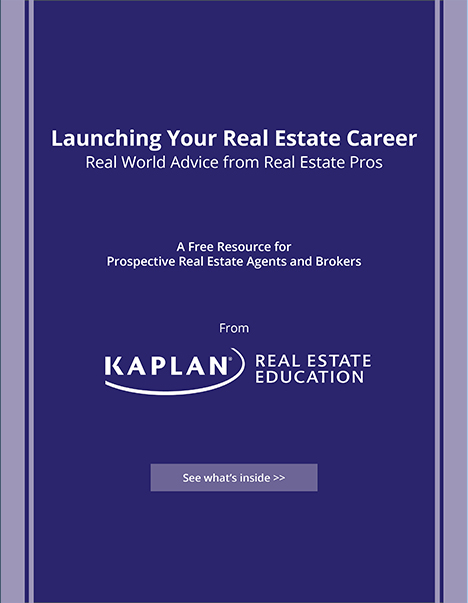How to Get Started on Real Estate Career

Posted by: Kaplan Real Estate Education
Published: May 19, 2020
Real estate prelicensing education prepares you to pass the licensing exam. However, it is light on information about how to be a successful real estate agent after you pass the exam. If you ask, your instructor will say you need to be skilled at marketing yourself, work hard, build a good book of business, network, and generate leads—all good advice. But, if you want a little more guidance and a few more trade secrets, this article offers 10 things you can do to succeed in real estate that aren't part of the prelicensing curriculum.
1. Hang your license with the brokerage that's right for you.
Most real estate companies are constantly recruiting salespeople. However, these brokers can differ a great deal in structure, operation, and philosophy. So, to be successful as a real estate agent, you shouldn't sign with any brokerage until you do some homework on your options. You need to make sure you are choosing a real estate office that you like and that will ultimately be the right fit for you.
This process should include scouting the area where you want to work as an agent, researching the brokers in that area to build a short list, and interviewing with the brokers on your list. Often in an interview, the focus is on the questions the potential employer will ask you. However, in your hunt for the right brokerage, you should come prepared with questions to ask in your interview. Check out this article, which features a video about how to interview a broker, for suggestions on the questions to ask and how to do your other research.
2. Create a plan for success and hold yourself accountable.
Once you've chosen your brokerage, you'll need a plan for how to be successful as a real estate agent. You need to set goals and develop a business plan. Most plans cover activities for attracting new clients. There are a number of resources available to help you prepare your plan.
Here are some additional helpful tips:
- Write one or two sentences about what could make you compelling to potential clients. This is your unique selling proposition.
- Develop a budget with a focus on the activities that you identify as having the potential for the highest ROI. This will ensure efficient use of funds for the right reasons.
- Create a calendar to guide planning for marketing and networking activities like email blasts, social media, trade shows, print mailers, and paid search.
- Develop metrics and daily activities all driven toward helping you meet your goals.
After you develop your plan, hold yourself accountable to it.
Thinking about starting a real estate career? Download the Launching Your Real Estate Career eBook.
3. Have savings that can tide you over in lean times.
At minimum, a real estate agent needs a mobile phone, a car (in most places), a computer, and wifi. These are things many brokerages expect you to provide yourself, along with other business startup costs. In addition, it might be a few months or so before you earn your first commission, and you're going to have to be able to cover daily living expenses.
So, if you're thinking of earning a real estate license in the next year, start saving whatever you can now. Although there is some financing available for eligible agents, putting a little money away at a time to ensure you can cover your costs for a couple of months is your best option. In addition, if you do have to tap into your savings account, try to replenish if after you start collecting commissions. Markets have their ups and downs, and there might be some lean times. It's always good to be prepared.
4. Learn what your customers really want and then deliver.
In real estate, the natural inclination is to put all the efforts into sales or purchases because we think that's what customers want. Actually, it's not. Customers are hungry for details and answers, and if you deliver them, they will remember and refer you. To become an expert, attend real estate continuing education and take as many professional development courses as you can. Experience is also a great teacher, so note things you learn as you work with customers and your broker. Also, try reaching out to someone in another market who knows more about a given topic than you. Equipped with expertise, encourage your customers to ask questions no matter how big or small. Also, advertise your knowledge by using social media or emails to share information—or see if you can have a column in a local newspaper, online magazine, or realty publication. Hold live information sessions or webinars because they can generate leads when you collect emails and follow up with useful information. A real estate agent who is known for having all the answers is poised for success.
5. Ask everyone you know for referrals—all the time.
Referrals are the bread and butter of real estate. According to the National Association of Realtors, 39% of sellers found their agents through a referral from friends or family, and 24% used their agent twice or more. Also, 69% of sellers and 70% of buyers say they'd use the same agent again. Here are some tips for getting referrals that you can use at the beginning of (and throughout) your career:
- Ask friends and family. Let them know you're licensed and are actively seeking buyers and sellers. Tell them you intend to work hard for anyone they refer to you.
- Keep asking. Once people have sent clients your way, ask those clients to tell other people. Keep up with past clients so you're top of mind when they need an agent again.
- Go above and beyond. Clients appreciate and remember hard work on their behalf, and they'll tell their friends, coworkers, and families. So always go the extra mile.
- Show your gratitude. Write a thank-you card to each referral source. For your best sources, consider a special token of your appreciation.
6. Use networking possibilities to their fullest potential.
Networking is an art that can be fun and rewarding. All it takes is knowing where to network and following a few simple rules for networking. Places that offer multiple networking opportunities are your local chamber of commerce, networking groups and real estate meetups, expos and events such as a home decorating showcase or a fair for expectant parents, volunteer groups and charity programs, your children's school, and online groups like those on Facebook. When you're networking at an event or meeting, here are some helpful hints for doing it effectively. Dress appropriately and professionally. If you look sharp, you make a good impression. Also, listen more than you talk. That conveys empathy and concern, which people appreciate. Focus on helping and answering questions rather than asking for referrals. Just slip someone your card at the end of a conversation. Also, take other people's cards, too, because you never know when a contact might help you or become a lead. And, finally, enter any of your leads in your customer relationship management system as soon as you can after you leave.
7. Advertise like a pro—it's less expensive than you think.
Marketing and advertising play a big role in succeeding as a real estate agent. The good news is it doesn't have to cost a lot. It starts with a memorable slogan that sets you apart. After that, there are a number of ways to effectively reach new clients and market yourself both online and off, on any budget. For example, you can advertise on search engines without shelling out thousands of dollars for a banner ad by using their pay-per-click programs, which only charge you if someone clicks your ad, and the fee for those clicks can be surprisingly affordable for locally-targeted keywords.
Social media can also boost your leads with just a small investment. Facebook and Twitter offer ways to advertise at a reasonable cost. And finally, round out your marketing plan with a real-estate-based ad platform, where you can post and highlight listings, as well as engage new clients. The gains often greatly outweigh the initial cost.
8. Embrace working at night and on weekends.
People shop for homes in their free time, which is typically nights and weekends. Buyers and sellers expect their real estate agent to be available for showings, open houses, and office visits on their schedules. Don't treat working off hours as a chore. Instead, embrace it, especially early in your career. Volunteer to work open houses for other agents on weekends. Let clients see that you're happy to be available whenever they need you, even if it's at an odd time, because that instills confidence in you. In some cases, it can even lead to a sale in a competitive market or during a bidding war. Clients remember these things and tell their friends, which can lead to referrals. As you become more successful, you can dial it back and work one day of the weekend to balance client service with your personal life.
9. Take advantage of open houses for lead generation.
You might hear people say that open houses are "not worth it" or they don't lead to a sale. Ignore them. Open houses have sign-up sheets that generate leads, and that makes them cost-effective marketing tools. All an open house takes are sellers who are agreeable, a few hours on a weekend, and a sign. Most people can't resist an open-house sign. So, on the day of the open house, be prepared for traffic and lots of questions. Use the opportunity to showcase your expertise and market knowledge. If you're newly licensed and don't have a listing yet, you can still benefit from an open house. Often brokerages are full of busy and experienced agents who are happy for another agent to volunteer for the open house so they can do other things at that time. After talking with the listing agent, you are often able to follow up with names on the sign-in sheet.
10. Always follow up.
Following up with interested prospects is integral to being a successful real estate agent. As a best practice, always contact your client about two days after you have shown them around a property. You should also keep following up until your client makes a decision one way or the other. If you've hosted an open house, call or email the leads on the sign-up sheet a day or two later. If someone mentions an interest in buying or selling in the near future, make a note of the names and get back in touch a short time later to see how things are progressing.
Now that you know how to be a successful real estate agent…
You're ready to get started. Find out what you need to do to become a real estate agent and then explore our real estate education packages in your state.
FREE eBook: Launching Your Real Estate Career

Wouldn't it be great if you could sit down with a room full of successful real estate professionals and ask them for career advice? We asked several accomplished real estate professionals what they wish they knew before they earned their license and started their career, and what they thought all aspiring real estate professionals should know. We put all of their advice into a value-packed eBook.
Download FREE eBook
How to Get Started on Real Estate Career
Source: https://www.kapre.com/resources/real-estate/10-tips-for-succeeding-in-real-estate-you-wont-learn-in-school/
0 Response to "How to Get Started on Real Estate Career"
Post a Comment